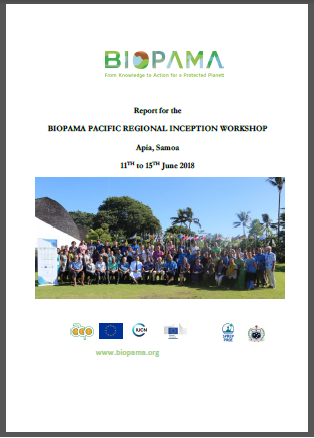
To formally launch the second phase of the Biodiversity and Protected Areas Management (BIOPAMA) programme, a regional inception workshop for the Pacific was held at the Tanoa Tusitala Hotel, Apia, Samoa from 11th to 15th June 2018. The aim of the inception workshop was to ensure that all 15 countries in the Pacific ACP Group of States were engaged for the second phase of BIOPAMA. The working title of the workshop was ‘Regional Workshop on Improving Information and Capacity for More Effective Protected Area Management and Governance in the Pacific’. The invited participants primarily centred on people who are directly involved in work relating to marine, coastal and terrestrial (including inland waters) protected areas including: national government staff, NGO project officers; staff from national, regional and international agencies and institutions, and; resource persons with special technical skills and experience. The ACP Secretariat was represented by Mr Edmund Jackson.
The main objectives of the regional inception workshop:
- Provide information about the second phase of the Biodiversity and Protected Area Management Programme BIOPAMA - its objectives, benefits to countries, expected results and main activities and involvement by countries and organisations.
- Engage with stakeholders and partners about priority needs and opportunities for improving data gathering, assessment of data and information and capacity development for decision making and effective management and governance of protected areas.
- Demonstrations of the: Pacific Islands Protected Area Portal (PIPAP) managed by SPREP in collaboration with the European Commission – Joint Research Centre EC-JRC with its links to the BIOPAMA Reference Information System (RIS), developed by EC-JRC to cover all countries of the ACP; UNEP World Conservation Monitoring Centre, and; other relevant web-based information tools for protected area planning and management.
- Provide general information about the BIOPAMA Action Component and identify national and local priorities that could guide decisions for investments through grant making (managed by IUCN).
- Obtain stakeholder views about issues that could be addressed through the BIOPAMA workplan.
- Facilitate a sharing forum for a wide cross section of protected area practitioners to contribute their experiences and ideas.












